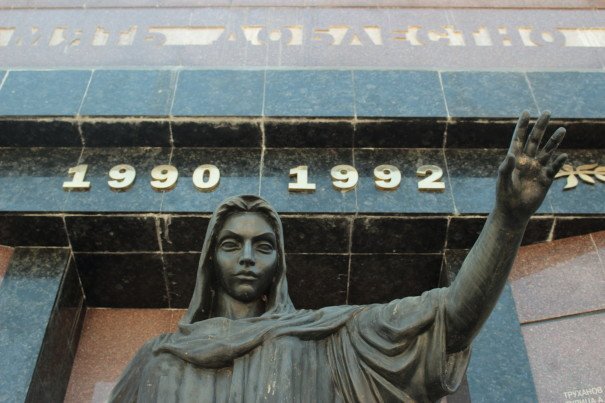
A World Half‑Imaginary and Wholly on Its Own

A World Half‑Imaginary and Wholly on Its Own
Ukrainian Beer in Transnistria
I get on a bus in Chisinau—a taxi, really—packed to capacity with six or seven standing people, and head out past the chaos of the city, past the tree-lined dirt roads between fields of feather-headed wheat. Somewhere out there is a military barricade, soldiers, and a tank dug in under camouflage. After twenty bare and rutted feet of road I enter another country, by its own reckoning, at least.
This is Transnistria, a breakaway region of Moldova enjoying self-declared independence and all of its attendant benefits—worthless money, diplomatic isolation, economic stagnation—since a bloody war in 1992. It is the last operating Soviet Republic in the world, a universe of Lenin statues, hammer-and-sickle insignias, and revolutionary symbols; its flag, a green stripe sandwiched between two red stripes, represents farmland encircled by rivers of blood.
I meet a Belgian couple en route to Odessa at the Tiraspol train station, all of us looking very out of place amid the lifeless concrete streets. A few cars, some old and some new, rumble by, and we take the shade of a café barely populated on this Saturday afternoon. They make Kvint here, a sort of brandy that costs two euros a bottle, but we opt for Ukranian beer instead. It has more liquid, and besides, you don’t want to get drunk in a legal system sitting firmly on the side of “fake.”
Under the umbrella shade we’re comparing our worn-out travel guides when an old woman, head-scarfed and holding still onto a few teeth, comes over from another table. She points at my backpack, on the ground, and says something in Russian; when I don’t understand she pretends to spit, points again, spits again, until I put the bag up on a chair.
In return she points to my guide and takes it back to her table. She flips through, talking to herself, laughing with recognition at some of the pictures. She doesn’t speak English, and it’s unclear just how much of what’s written in there she understands, but all of these places, far off and close by, seem to trigger something in her, an animating factor that lifts her out of this communist holdover and into a wider world she has likely never seen. Ever will, for that matter.
We go back out into the searing day and find what seems like half the city bathing along the wide Dniester riverbanks. The parks are weedy and the boulevards mostly empty and the memorials all in that dramatic socialist style that looks as if each statue was modeled inside a tornado. My visa is only good for 10 hours and I spend about six of them before heading back to Chisinau while the Belgians move on to Ukraine. I get back in a maxitaxi and pass dug-in machine gun pits, the country still primed for war. My mind is on that old woman, blowing us kisses as we leave, having a blast of a Sunday afternoon with a beer and a borrowed book in this place, half-imaginary and wholly on its own.